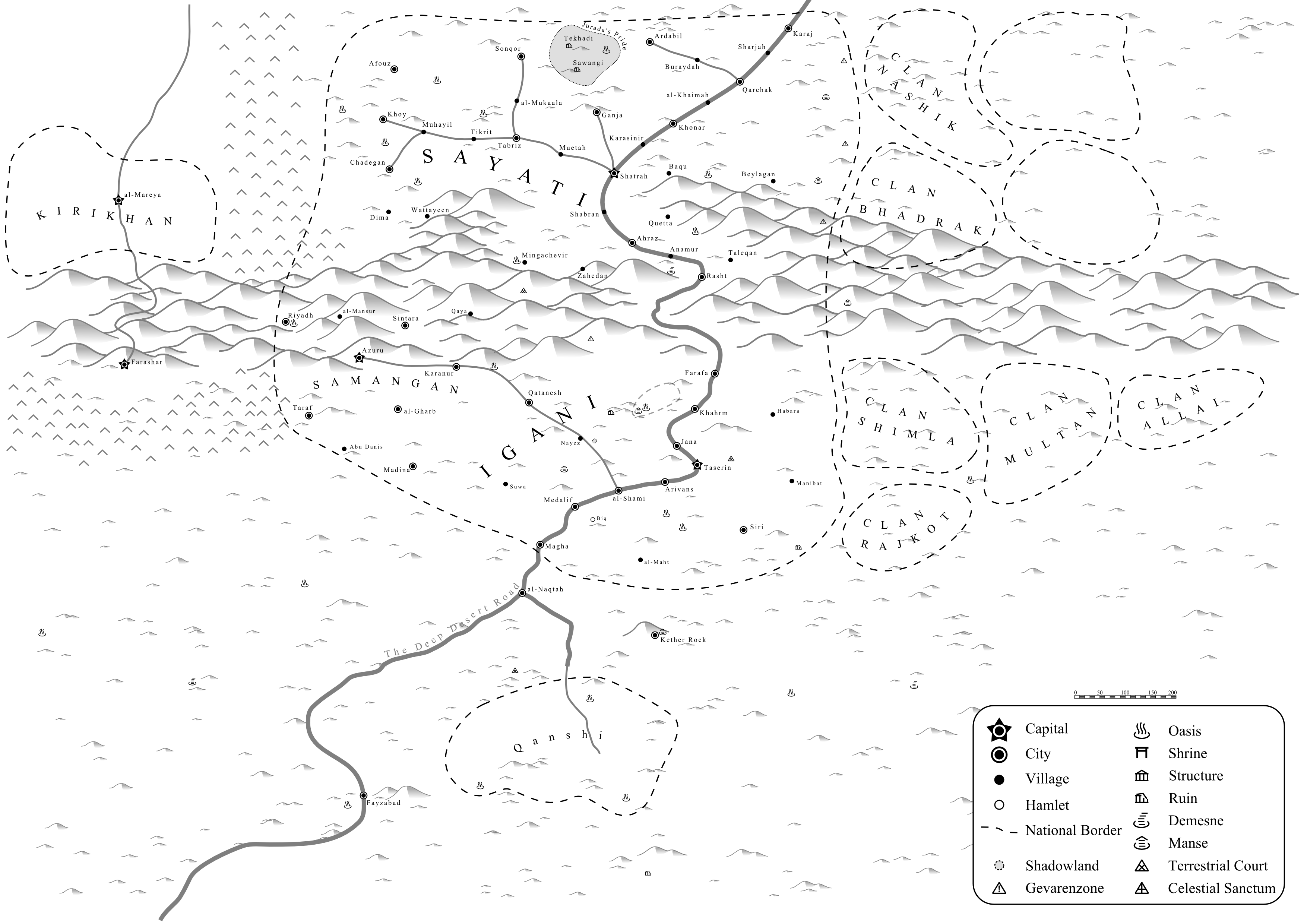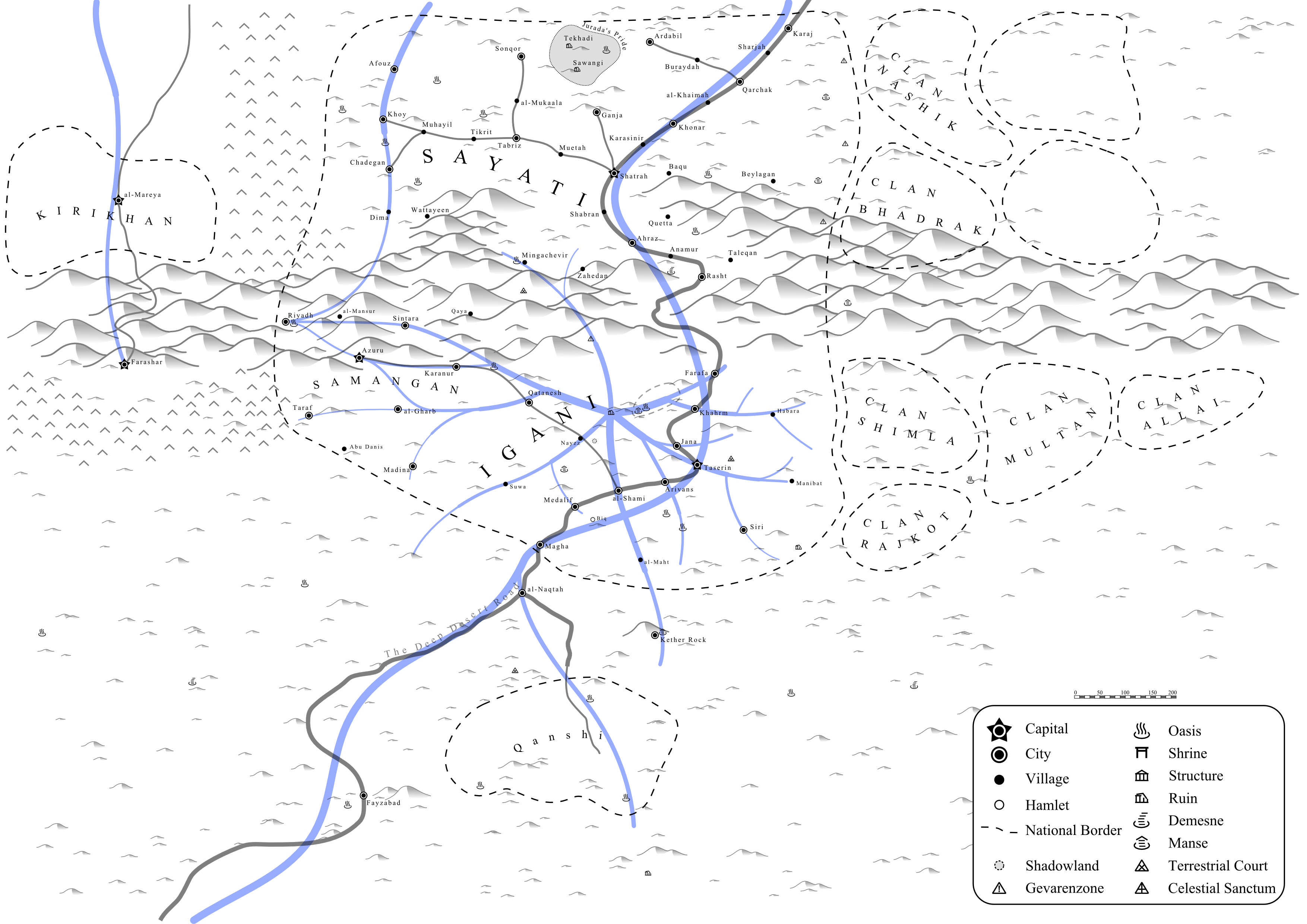Location Information
Table of Contents
The caliphate of Suran neighbours the Delzahn, and stradles the mountain range through which the Deep Desert Road travels via the Great Pass.
Keryan rules as Caliph of Suran from his residence in the capital of Shatrah. It is commonly known that he shares his power with Azizah, who has a large hand in the steering of the caliphate.
The Surani people and culture are an amalgamation of Sayati and Igani traditions and culture, both influenced strongly by the Delzahn.
Geography
The norther region, Sayati, is bounded in the north by the vast mountain ranges, and in the east and west by perilous terrain. The perilous terrain in the west is due to several dangerous manses and supernatural defence works built up over the centuries, whereas the terrain in the east has a more natural origin. To the south is the mountain range separating the deep desert from the coastal area of the south; on the other side of this mountain range lie the southern regions.
The southern regions, Igani and Samangan, are bounded only in the north by mountains. To the west, east, and south there is only desert. Any notion of a clear boundary here gives way to a more fluid definition, as the desert stretches beyond the eye.
Diplomatic Relations
External
Suran pays tribute to House Tepet. The strap, lady Ragara Soras Ketitia, has taken a liking to the frequent bribes and resides in Shatrah.
Representatives of both The Lap and Harborhead reside in Shatrah.
Throughout Igani's sultanate period relations with the Delzahn have been difficult for both Igani and Sayati. The Delzahn horde deems itself superior to most of it's neighbours, a claim the Delzahn can back with superior numbers, if not superior weapons. Currently relations between Suran and the Delzahn are positive. Suran maintains warm relations with the Chiaroscuran Delzahn by virtue of the alliance and friendship between Clan Rahim, the clan of tri-khan Garret, and Azizah.
Internal
At least one of the daughters of high nobility, Roxelana, in Sayati is married with a Prince in the former Samangan alliance. As she put in an substantial amount of effort to distance herself from her family, this does not really constitute a familial alliance as is usually the case.
Laws
To the extent that a codified system of laws exists, there are only a few codified laws and those deal mostly with property and taxes, the common laws do not differ strongly among the regions of Suran.
The laws mentioned here are of interest due to their deviation from the norm in the surroundings, or due to their unclear status.
Harem laws
As part of his socio-political reforms Selim al-Najib issued edicts pertaining to marriage and concubinage in Igani. These laws have become known as the 'harem laws' and have had a positive effect on the well-being and treatment of women throughout the sultanate.
According to the harem laws, a common man may take up to four wives, and each of those wives must have her own property, assets, and dowry. A nobleman may take as many wives as he can afford, and is allowed to maintain at most five concubines per wife. It is illegal for a man to marry multiple wives, or take concubines, if he is unable to afford to take care of each of them properly. However, due to the skewed gender demographic, polygamy is not uncommon and is the rule rather than the exception.
The then sultan of Igani acknowledged the fact that the harem laws can not be implemented without auditing. However, traditionally no man, and only a eunuch in employment of the husband, is allowed to enter the harem. To circumvent social custom the former sultan appointed his own wives as the officials in charge of auditing, and issued an edict allowing his wives unrestricted access to all harems within the sultanate.
This law is currently in a state of ambiguity. It is still observed in Igani and Samangan, but has never been enforced in Sayati.
Prohibition of Slavery
As of 769, 22 Resplendent Water, owning or trading slaves is prohibited to residents of Igani. Parts of the spirit of this law were inspired by the efforts of Keryan to free slaves from the large cities. According to the Prohibition of Slavery law no citizen of Igani may own or trade slaves. This law allows for the transport of slaves through Igani.
The Prohibtion of Slavery law allows former slave owners to keep their slaves as indentured servants starting the moment the law comes into effect. Previous owners are allowed to keep former slaves in indentured servitude until the former slaves have worked off a sum of money equal to the amount they cost to acquire minus the wages that would have been paid to them were they not slaves.
After the formation of Suran, this law has been applied to the whole of the caliphate.
Arms and Armor
All men are allowed to bear arms and wear armor. Although there are some restrictions to the type of weaponry they are allowed to carry in some cities.
All women are prohibited from bearing arms, wearing armor, or practicing martial arts. However, as of 769, 22 Resplendent Water, the laws restricting the training and use of weapons and martial arts have been modified so as to include a loophole that allows unmarried woman to practice martial arts, if trained by a woman. This loophole was obscured in a paragraph during signing of the Prohibtion of Slavery law.
Azizah personally ensured that this loophole was properly translated to the new laws of Suran.
Formation
The caliphate of Suran was founded on 1 Ascending Fire of the year 775, as a result of the merging of the Igani Sultanate and the Sayati Empire, via the marriage of the Keryan and Ruya al-Qureshi.
The formation of Suran was the result of peace negotiations between the two former countries. On 773, 28 Descendent Earth, the short war between Igani and Sayati was ended with the withdrawal of Igani troops. Immediately thereafter, negotiations were opened to unite the two countries through intermarriages.
To cement this new situation, and to show that the influence of the noble clans of Sayati is acknowledged Keryan married Ruya al-Qureshi, Fadia al-Safahr, Raniya al-Bazara and Shakila al-Toma in a week-long feast around 774, Descending Water.
Maps
There are some maps available of Suran and the surrounding areas:



